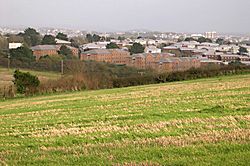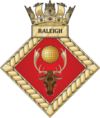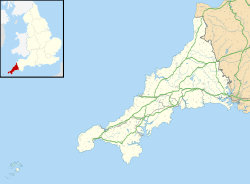HMS Raleigh (shore establishment) facts for kids
Quick facts for kids HMS Raleigh
|
|
|---|---|
| Torpoint, Cornwall in England | |

Accommodation blocks at HMS Raleigh
|
|
 |
|
|
Location in Cornwall
|
|
| Coordinates | 50°22′26″N 4°13′22″W / 50.3739°N 4.2227°W |
| Type | Naval training establishment |
| Area | 331 hectares (820 acres) |
| Site information | |
| Owner | Ministry of Defence |
| Operator | Royal Navy |
| Condition | Operational |
| Site history | |
| Built | 1940 |
| In use | 1940 – present |
| Garrison information | |
| Current commander |
Captain Jane Roe |
HMS Raleigh is a special place where young people learn to become sailors in the Royal Navy. It's like a big school for new recruits, located in Torpoint, Cornwall, in the United Kingdom. Even though it's called a "ship" (a stone frigate is a naval base on land), it's actually a huge training center spread out over many acres. Here, future sailors learn important skills like how to control damage on a ship and how to fight fires. They even have a real ship, the former HMS Brecon, that stays docked there just for training! Its main job is to give new recruits their very first training.
Contents
History of HMS Raleigh
Starting the Training Base
HMS Raleigh first opened its doors on 9 January 1940. It was set up to train new sailors, especially after a law in 1939 said that all young men aged 20 and 21 had to join the military for six months.
World War II and Beyond
During World War II, a sad event happened at Raleigh. On 28 April 1941, a German bomb hit an air-raid shelter, and 44 sailors and 21 Royal Engineers lost their lives. Later, in 1944, the United States Navy used the base to prepare for the Invasion of Normandy, a very important part of the war. But by July 1944, Raleigh was back with the Royal Navy, continuing to train sailors.
Modernizing and Expanding Training
In the early 1950s, Raleigh became the main training center for new engineers and mechanics. They even used a cruiser, HMS Newfoundland, for hands-on training with ship engines and boats.
The base got a big update in the 1970s. In the early 1980s, Raleigh started training women from the Women's Royal Naval Service and also took over training for skilled technicians and supply staff. These trainings used to happen at other bases.
By 1990, male and female recruits began training together. Over the next ten years, Raleigh also welcomed the Cookery School and the Submarine School. The Cookery School moved to a different location in 2022. The Submarine School is also planning to move in 2027.
Training Today
Since 2007, the first phase of training for all new Royal Navy recruits has grown from eight weeks to ten weeks. Today, HMS Raleigh teaches many different courses, including:
- General military skills
- How to handle a ship (seamanship)
- Logistics (how to manage supplies and equipment)
- How to operate submarines
It also helps prepare crews for their missions around the world. HMS Raleigh used to be home to the Defence Maritime Logistics School, which trained officers and ratings in areas like cooking, stewarding, and administration. It also hosted the Seaman Specialist School and the HM Royal Marines Band Plymouth.
 | Tommie Smith |
 | Simone Manuel |
 | Shani Davis |
 | Simone Biles |
 | Alice Coachman |


